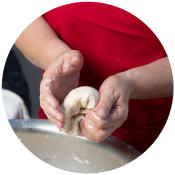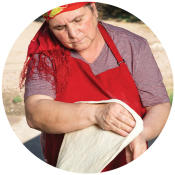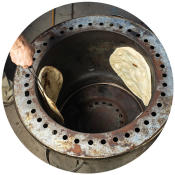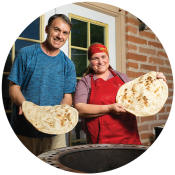Sharing The Table and Breaking Bread
By Debbie Weingarten
 Wansa Bakr can’t talk about what happened when militants drove thousands of civilians into the Sinjar Mountains in August 2014. She can say that her family spent days without water, and that the only food was homemade flatbread, hastily packed as they fled for their lives.
Wansa Bakr can’t talk about what happened when militants drove thousands of civilians into the Sinjar Mountains in August 2014. She can say that her family spent days without water, and that the only food was homemade flatbread, hastily packed as they fled for their lives.
After a week trapped in the mountains, they then walked for five days to Turkey, where they waited for a year to be issued passports. Wansa’s husband, Saeed, an interpreter for the U.S. Army, had been in Tucson since 2012. Wansa and five of their children finally joined him in December 2015.
Today the Bakrs are among approximately 11,000 refugee families currently settled in Tucson, and are part of the Iskashitaa Refugee Network. Since 2003, refugees and volunteers have worked together to harvest more than a million pounds of produce from backyards, farms, and orchards. The produce is donated to food banks, schools, soup kitchens, and hundreds of refugee families.
For Wansa and her family, the very flatbread that kept them alive on the mountain has provided a pathway to a new life in Tucson. It began with the documentary film Taste Bud Memories by filmmaker Özlem Ayse Özgür, which featured Wansa as an artisan baker making traditional Yazidi naan in an outdoor tandoori oven.
“This naan always reminds me of my homeland,” says Wansa in the film. “When I make naan, I say, we are not going to forget our origin, our food, our culture and traditions.”
Ethopian & Eritrean
During the filming of the documentary, Wansa was introduced to local baker Don Guerra, the owner of Barrio Bread. A professional baker for 28 years, Guerra famously launched his most recent bakery business out of his garage a decade ago. Since then, he has partnered with farmers and chefs to reintroduce heritage grains into the market and has opened a storefront bakery in historic Broadway Village, earning a James Beard Award nomination along the way.
“A lot of what I do is collaboration,” says Guerra. “It’s a way to uplift the community, to take starting brands and lift them up.” He offered to mentor Wansa through the process of founding a food business. “That was a year ago,” he says, in amazement. “She’s now in four farmers’ markets and has an industry going.”
 For Wansa and Saeed, farmers’ market mornings begin before dawn, when they rise to package the naan and make a handful of other products for sale—hummus, tzatziki, homemade yogurt, baba ghanoush, and date pastries. At the farmers’ market, they set up tables and unroll a vinyl sign with a photo of Wansa and her bread at the very center. Children stroll by with their parents, occasionally stopping to sample the naan. When Wansa sees them—their big eyes, their little fingers—she places entire pieces of bread in their hands.
For Wansa and Saeed, farmers’ market mornings begin before dawn, when they rise to package the naan and make a handful of other products for sale—hummus, tzatziki, homemade yogurt, baba ghanoush, and date pastries. At the farmers’ market, they set up tables and unroll a vinyl sign with a photo of Wansa and her bread at the very center. Children stroll by with their parents, occasionally stopping to sample the naan. When Wansa sees them—their big eyes, their little fingers—she places entire pieces of bread in their hands.
Guerra recalls that when he began his business, he was counseled regularly to guard his techniques, recipes, and resources—to keep them secret. But as a former teacher, Guerra says this advice never felt right. For him, the way forward, in business and in community, was through sharing. “Refugees have a place in our community and have a lot to share,” he says. “Someone like Wansa, who has been making this bread for her entire life, is looking for a viable business and sustainability for her family. And we welcome them in.”
Debbie Weingarten is a writer and editor based in Tucson. Her work has appeared in the New York Times, Guernica, The Guardian, Longreads, and Vela, among many other outlets, including the Best of Food Writing 2016 and 2017 anthologies. She was a finalist for a 2019 James Beard Award for Investigative Reporting.
